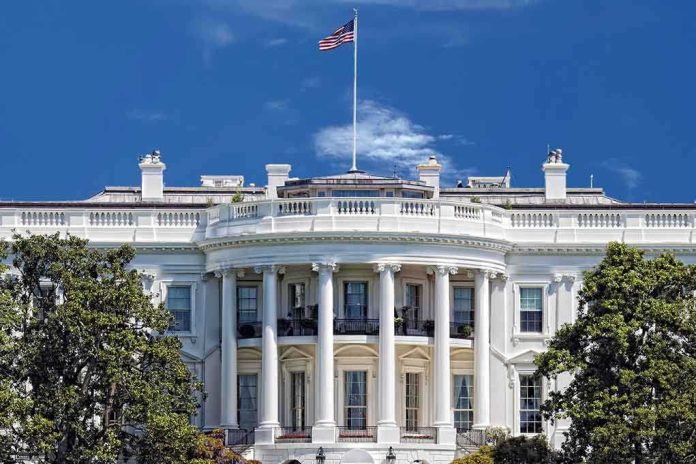
A single, offhand promise from a U.S. president to “have Eric call” during a global peace summit has thrown open the door to a world where the line between American diplomacy and private family business is not just blurred, but possibly erased.
Story Snapshot
- Trump’s private hot-mic exchange with Indonesia’s president at a Gaza summit sparks conflict of interest firestorm.
- The Trump Organization’s expanding business in Indonesia is thrust into global scrutiny.
- Direct evidence emerges of foreign leaders seeking access to Trump’s family for business leverage.
- No official clarification is given, fueling debate over presidential ethics and U.S. foreign policy integrity.
Presidential Power and Private Business: The Hot-Mic Heard Round the World
Monday, October 13, 2025, in the marble corridors of Sharm el-Sheikh, Egypt, a routine peace summit became the scene of an extraordinary breach. President Donald Trump, just off the podium addressing a tense room of world leaders about the Gaza ceasefire, found himself unwittingly broadcast. Indonesian President Prabowo Subianto, leaning in, asked if he could meet Eric—Trump’s son and executive vice president of the family’s real estate empire. Trump, never one to miss a beat, replied, “I’ll have Eric call. Should I do that? He’s such a good boy, I’ll have Eric call.” The exchange, captured and published by Reuters, ignited an international debate on the ethics of presidential business entanglements.
Neither leader seemed aware their conversation was being streamed to the world. Prabowo’s mention of “a region that is not safe, security-wise,” and his further reference to “Hary”—understood to be Indonesian billionaire Hary Tanoesoedibjo, Trump’s longtime business partner—hinted at more than idle small talk. The implication was clear: official summits, peace talks, and global crises had become backdrops for brokering private deals. The fact that Prabowo explicitly requested a meeting with Eric Trump, and even cited Don Jr. as an acceptable alternative, underlines the transactional nature foreign leaders attribute to the Trump family’s business connections.
Indonesia: A Test Case for the Trump Organization’s Global Web
The Trump Organization’s ambitions in Indonesia are anything but a secret. The golf club near Jakarta is already operational, and the “coming soon” luxury resort in Bali is a neon sign for ongoing expansion. Millions of dollars flowed from Indonesia into Trump’s accounts during his first presidency, with the precise stakes in current ventures left purposefully opaque. This matters not just for the balance sheet, but for the balance of power. Trump’s direct engagement with Indonesian leadership, through his children, provides foreign heads of state with a back channel to American influence—one that intertwines the fate of global diplomacy with the fortunes of family business.
The White House, caught flat-footed, has stuck to its story: Trump’s assets are in a family-run trust; he has no hand in daily operations. Yet, the timing is hard to ignore. The Trump family’s wealth has ballooned in 2025, fueled by aggressive bets on cryptocurrency—just as the administration rolls back regulations in those very markets. Critics see a pattern; supporters call it a witch hunt. What’s not in dispute: the Trump Organization’s entanglements in Indonesia present a case study in the hazards of mixing presidential responsibility with private enterprise.
The Ripple Effects: Diplomacy, Ethics, and the American Brand
The hot-mic moment’s fallout is as much about perception as it is about policy. Tom Pepinsky, a Cornell professor and Southeast Asia expert, summed it up with brutal clarity: “President Prabowo Subianto’s hot-mic moment with President Trump revealed… just how many foreign leaders are eager to exploit the Trump administration’s transactional foreign policy.” Pepinsky’s assessment is damning—not just for the individuals, but for the system that enables such entanglement. In a region where business and governance are often inseparable, the U.S. risks importing those norms into its own foreign policy playbook.
Hot-mic moment: Indonesia’s President Prabowo Subianto asks to meet Trump’s sons Eric and Don Jr.
Prabowo mentioned a region that was "not safe, security-wise," before asking Trump about the meeting. pic.twitter.com/JfesHyip6O
— Clash Report (@clashreport) October 14, 2025
Indonesia’s domestic politics barely register the scandal; Prabowo’s popularity is unshaken. But for U.S. institutions, the incident is a gut check. Official denials ring hollow in the face of live audio and coordinated requests for access to the president’s family. The viral spread of the footage across global media ensures the story won’t fade quickly. For the Trump Organization, the attention could paradoxically prove lucrative—advertising their Indonesian ambitions to partners who see presidential proximity as a golden opportunity.
Unanswered Questions and the Future of Presidential Accountability
Neither the White House, the Trump Organization, nor the Indonesian government has offered a clear account of what was discussed. Was this a conversation about new resorts, security for existing ventures, or something else entirely? The audio, muffled and fragmentary, raises more questions than it answers. The mention of “Hary” is widely assumed to refer to Tanoesoedibjo, but the tape provides no confirmation. What is clear is the precedent: foreign policy and private business, once guarded by ethical walls, now operate in the open, side by side.
The implications reach beyond this single incident. For decades, American presidents have managed, if not always perfectly, to separate their public duties from private gain. The Trump-Prabowo hot-mic moment lays bare how fragile those boundaries have become. In the age of livestreamed diplomacy and viral scandals, the American public—and the world—must reckon with what happens when presidential business is everybody’s business.



